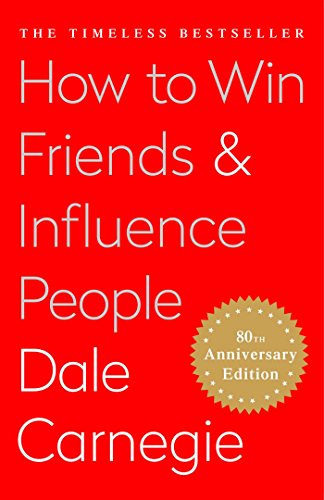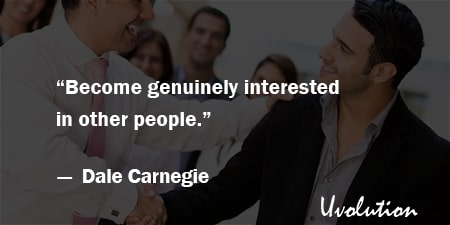How to Win Friends and Influence People by Dale Carnegie
The Book in 1 Sentences
“‘Compared to what we ought to be, said the famous Professor William James of Harvard, ‘compared to what we ought to be, we are only half awake. We are making use of only a small part of our physical and mental resources. Stating the thing broadly, the human individual thus lives far within his limits. He possesses powers of various sorts which he habitually fails to use.’
Those powers which you ‘habitually fail to use’! The sole purpose of this book is to help you discover, develop, and profit by those dormant and unused assets. ‘Education,’ said Dr. John G. Hibben, former president of Princeton University, ‘is the ability to meet life’s situations.’
If by the time you have finished reading the first three chapters of this book—if you aren’t then a little better equipped to meet life’s situations, then I shall consider this book to be a total failure so far as you are concerned. For ‘the great aim of education,’ said Herbert Spencer, ‘is not knowledge but action.’ And this is an action book.” ~ Dale Carnegie
6 BIG Ideas
1. Tips for Getting the Most Out of This Book
2. Don’t criticize, condemn or complain
3. A Simple Way to Make a Good First Impression.. Smile!
How to Win Friends and Influence People Book Summary
1. Tips for Getting the Most Out of This Book
“If you wish to get the most out of this book, there is one indispensable requirement, one essential infinitely more important than any rule or technique. Unless you have this one fundamental requisite, a thousand rules on how to study will avail little.
And if you do have this cardinal endowment, then you can achieve wonders without reading any suggestions for getting the most out of a book. What is this magic requirement? Just this: a deep, driving desire to learn, a vigorous determination to increase your ability to deal with people.
How can you develop such an urge? By constantly reminding yourself how important these principles are to you. Picture to yourself how their mastery will aid you in leading a richer, fuller, happier, and more fulfilling life. Say to yourself over and over: ‘My popularity, my happiness and sense of worth depend to no small extent upon my skill in dealing with people.’”
“Learning is an active process. We learn by doing. So, if you desire to master the principles you are studying in this book, do something about them. Apply these rules at every opportunity. If you don’t, you will forget them quickly. Only knowledge that is used sticks in your mind.”
And remember that “The world is full of people who are grabbing and self-seeking. So the rare individual who unselfishly tries to serve others has an enormous advantage. He has little competition.”
2. Don’t criticize, condemn or complain
“Do you know someone you would like to change and regulate and improve? Good! That is fine. I am all in favor of it. But why not begin with yourself? From a purely selfish standpoint, that is a lot more profitable than trying to improve others—yes, and a lot less dangerous. ‘Don’t complain about the snow on your neighbor’s roof,’ said Confucius, ‘when your own doorstep is unclean.’”
“That was the most lurid personal incident in Lincoln’s life. It taught him an invaluable lesson in the art of dealing with people. Never again did he write an insulting letter. Never again did he ridicule anyone. And from that time on, he almost never criticized anybody for anything.”
“‘If there is any one secret of success,’ said Henry Ford, ‘it lies in the ability to get the other person’s point of view and see things from that person’s angle as well as from your own.’”
“Benjamin Franklin, tactless in his youth, became so diplomatic, so adroit at handling people, that he was made American Ambassador to France. The secret to his success? ‘I will speak ill of no man,’ he said, ‘. . . and speak all the good I know of everybody.’
Any fool can criticize, condemn and complain—and most fools do. But it takes character and self-control to be understanding and forgiving.”
“Instead of condemning people, let’s try to understand them. Let’s try to figure out why they do what they do. That’s a lot more profitable and intriguing than criticism; and it breeds sympathy, tolerance and kindness. ‘To know all is to forgive all.’
As Dr Johnson said: ‘God himself, sir, does not propose to judge man until the end of his days.’ Why should you and I?”
3. A Simple Way to Make a Good First Impression.. Smile!
“You don’t feel like smiling? Then what? Two things. First, force yourself to smile. If you are alone, force yourself to whistle or hum a tune or sing. Act as if you were already happy, and that will tend to make you happy. Here is the way the psychologist and philosopher William James put it:
‘Action seems to follow feeling, but really action and feeling go together; and by regulating the action, which is under the more direct control of the will, we can indirectly regulate the feeling which is not.
Thus, the sovereign voluntary path to cheerfulness, if our cheerfulness be lost, is to sit up cheerfully and to act and speak as if cheerfulness were already there.’”
“Actions speak louder than words, and a smile says, ‘I like you. You make me happy. I am glad to see you.’”
“You must have a good time meeting people if you expect them to have a good time meeting you.”
4. The Golden Rule
“Philosophers have been speculating on the rules of human relationships for thousands of years, and out of all that speculation, there has evolved only one important precept. It is not new. It is as old as history.
Zoroaster taught it to his followers in Persia twenty-five hundred years ago. Confucius preached it in China twenty-four centuries ago. Lao-tse, the founder of Taoism, taught it to his disciples in the Valley of the Han. Buddha preached it on the bank of the Holy Ganges five hundred years before Christ. The sacred books of Hinduism taught it a thousand years before that. Jesus taught it among the stony hills of Judea nineteen centuries ago. Jesus summed it in one thought: ‘Do unto others as you would have others do unto you.’
You want the approval of those with whom you come in contact. You want recognition of your true worth. You want a feeling that you are important in your little world. You don’t want to listen to cheap, insincere flattery, but you do crave sincere appreciation. You want your friends and associates to be, as Charles Schwab put it, ‘hearty in approbation and lavish in their praise.’ All of us want that.
So let’s obey the Golden Rule, and give unto others what we would have others give unto us.
How? When? Where? The answer is: All the time, everywhere.”
Zoroaster says: “Whatever is disagreeable to yourself do not do unto others.”
Confucius says: “‘Is there a single word which can be a guide to conduct throughout one’s life?’ The Master said, ‘It is perhaps the word ‘shu.’ Do not impose on others what you yourself do not desire.’”
Lao-tse says: “To those who are good to me, I am good; and to those who are not good to me, I am also good; and thus all get to receive good.”
Buddha says: “Hurt not others with that which pains yourself.”
Hinduism says: “This is the sum of duty: do naught to others which if done to thee would cause thee pain.”
5. Admit your mistakes quickly and emphatically
“The policeman, being human, wanted a feeling of importance; so when I began to condemn myself, the only way he could nourish his self-esteem was to take the magnanimous attitude of showing mercy.
But suppose if I had tried to defend myself—well, did you ever argue with a policeman?
But instead of breaking lances with him, I admitted that he was absolutely right and I was absolutely wrong; I admitted quickly, openly, and with enthusiasm.
The affair terminated graciously in my taking his side and his taking my side. Lord Chesterfield himself could hardly have been more gracious than this mounted policeman, who, only a week previously, had threatened to have the law on me.
If we are going to be rebuked anyhow, isn’t it far better to beat the other person to it and do it ourselves? Isn’t it much easier to listen to self-criticism than to bear condemnation from alien lips?
Say about yourself all the derogatory things you know the other person is thinking or wants to say or intends to say—and say them before that person has a chance to say them. The chances are a hundred to one that a generous, forgiving attitude will be taken and your mistakes will be minimized just as the mounted policeman did with me and Rex.”
“If you are wrong, admit it quickly and emphatically.”
6. Give honest and sincere appreciation
“Emerson said: ‘Every man I meet is my superior in some way. In that, I learn of him.’
If that was true of Emerson, isn’t it likely to be a thousand times more true of you and me?
Let’s cease thinking of our accomplishments, our wants. Let’s try to figure out the other person’s good points. Then forget flattery. Give honest, sincere appreciation. Be ‘hearty in your approbation and lavish in your praise,’ and people will cherish your words and treasure them and repeat them over a lifetime—repeat them years after you have forgotten them.”
“The only way to get the best of an argument is to avoid it.”
“Show respect for the other person’s opinions. Never say, ‘You’re wrong.’”
“Become genuinely interested in other people.”
“Be a good listener. Encourage others to talk about themselves.”
“Try honestly to see things from the other person’s view.”
“Make the other person feel important—and do it sincerely.”
And “Remember that a person’s name is to that person the sweetest sound and most important sound in any language.”
That was my QUICK summary of the great book How to Win Friends and Influence People by Dale Carnegie. If you’re interested, get your copy. There is a HUGE amount of life-changing ideas in this book, and we’ve only touched on a tiny bit of it.
Buy The Book: How to Win Friends and Influence People by Dale Carnegie

GET Blinkist 7 Days FREE Trial
3000+ Book Summaries
(Audio and Text)








